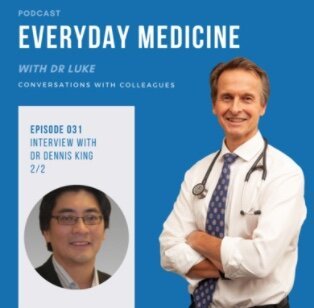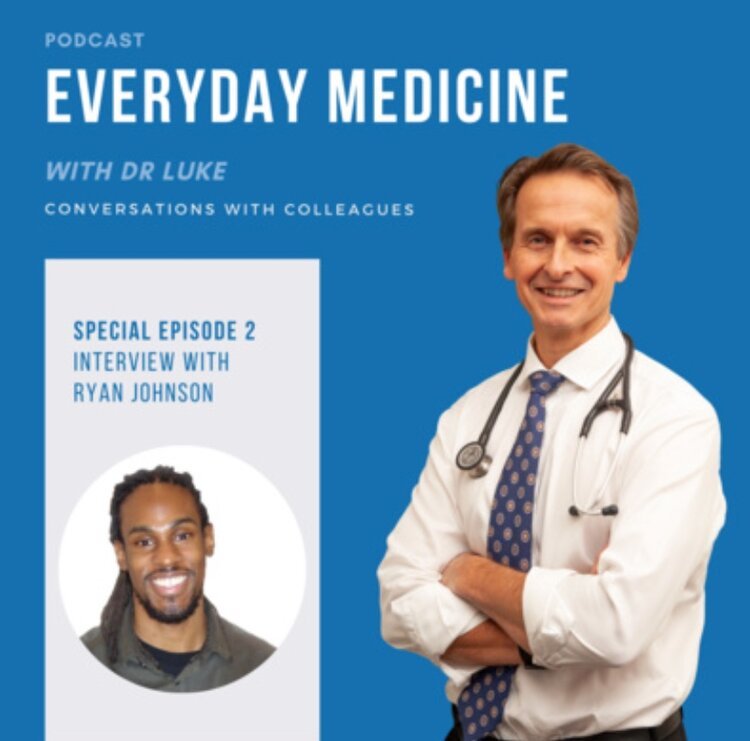Everyday Medicine by Dr Luke Crantock
Conversations with colleagues providing helpful ideas and advice in healthcare
Episode 38. Hypertension with Dr Minz Che
Based on the Australian Bureau of Statistics National Health Survey data about one in three people over the age of 18 living in Australia have hypertension or were taking blood pressure lowering medications. A staggering number requiring therapy for a condition which impacts on cerebrovascular disease, coronary artery disease, chronic kidney disease, heart failure and mortality.
Episode 37. Why We Get Fat And What We Can Do About It with Professor Joseph Proietto
The western world faces a very significant obesity epidemic. In Australia, two-thirds of our population or 12.5 million are either overweight or obese and as a consequence may experience many medical sequelae including development of the metabolic syndrome, type 2 diabetes, cardiovascular disease, cerebrovascular disease, osteoarthritis and depression, contributing significantly to our health burden. In the first part of this series, we were joined by Joseph Proietto, Professor Emeritus at the University of Melbourne, the Department of Medicine at Austin Health and an endocrinologist specialising in diabetes and obesity to discuss why we become obese. Professor Proietto joins us again to guide us through a strategy of how to treat and manage obesity and direct our patients toward a healthy body mass index (BMI).
Episode 36. Why We Get Fat with Professor Joseph Proietto
Up to two thirds of Australians are either overweight or obese as defined by body mass index (overweight: BMI 25-29.9, obese: BMI >30) with subsequent significant medical consequences including cardiovascular disease, type 2 diabetes, cerebrovascular disease (metabolic syndrome), osteoarthritis and depression. Becoming overweight and obese involves complex interactions between neurohormonal systems of the gut, neurobiology of the brain (particularly the hypothalamus) and leptin production from adipose sites coupled with an environment where there is an abundance of high glycaemic energy dense foods. Science demonstrates that the overarching controls of obesity are genetic (70%) rather than environmental (30%). Adoption studies relating to monozygotic twins demonstrate this. In view of the metabolic consequences of obesity, understanding why we get fat is extremely important to medical practitioners.
Episode 35. The spleen and postsplenectomy syndrome with Dr Mohammed Al Souffi
The spleen performs a large number of important functions including processing and removal of opsonized pathogens, cellular maintenance, immunoglobulin production and the removal of effete worn out red blood cell. When removed either through trauma or for therapeutic indications the risk of overwhelming post splenectomy infection (OPSI) increases significantly; up to 58 times the general population in the setting of trauma and up to 1,100 times increased risk when for thalassaemia.
Episode 34. Atherosclerosis with Dr James Sapontis
Coronary artery disease caused by atherosclerosis is responsible for one heart attack every ten minutes in Australia. Not all plaques however are equally dangerous or vulnerable, and stable plaques may be asymptomatic and associated with low risk of coronary events contrasted with the unstable or ruptured plaque. To discuss this very interesting subject in more detail we are joined by Dr James Sapontis, experienced cardiologist and head of complex coronary intervention at Monash Heart who will consider:
Episode 33. New Advances in Cardiology with Dr James Sapontis
We are joined today by Dr James Sapontis, head of complex coronary intervention at Monash Heart and formerly trained through Mahi Missouri and Kings College London to discuss new advances in the field of cardiology.
Episode 32. Lung Cancer with Mr Cliff Choong
Lung cancer is a major problem facing Australian doctors representing 9% of all cancer diagnoses and with 12,200 new cases of lung cancer diagnosed each year it is the fifth most commonly diagnosed cancer, but the most common cause of cancer death in this country for both men and for women. The early presentation of lung cancer may be as subtle as a small coin lesion or nodule seen on chest imaging and there are a multitude of ways in which such nodules may be interrogated further. Whilst a wait and watch approach may be appropriate, further evaluation by VATS with a tissue diagnosis maybe required.
Episode 31. Benign Prostatic Hyperplasia with Dr Dennis King
Benign prostatic hyperplasia (BPH) is a common condition as men age and the most common benign tumour in men. Approximately half of all men between the age of 51 and 60 years have BPH and upto 90% of men over the age of 80 years have it. Prostate enlargement can be responsible for a variety of urinary symptoms including hesitancy with poor urinary flow, frequency, nocturia and incontinence. Where surgery was once a likely outcome for this condition many medical therapies have evolved to provide suitable alternatives including Alpha 1 adrenoceptor blockers resulting in smooth muscle relaxation in the prostate and bladder neck, 5-alpha reductase inhibitors which reduce prostate volume and growth by inhibiting the conversion of testosterone to dihydrotestosterone (DITT) and phosphodiesterase 5 inhibitors which may improve quality of life and voiding symptoms.
Special Episode 2. The Way to Walk with Ryan Johnson
In this podcast episode, we have a conversation with physiotherapist Ryan Johnson of R3 Physiotherapy in London who is passionate about gait correction and has written a book called The Way to Walk.
Episode 30. Controversies in Prostate Cancer with Dr Dennis King
Prostate cancer is the second most commonly diagnosed cancer among men and the second most common cause of death from cancer in men, yet many prostate cancers are not fatal and some autopsy series have demonstrated up to 50% or more silent prostate cancers in men over the age of 70 years.










